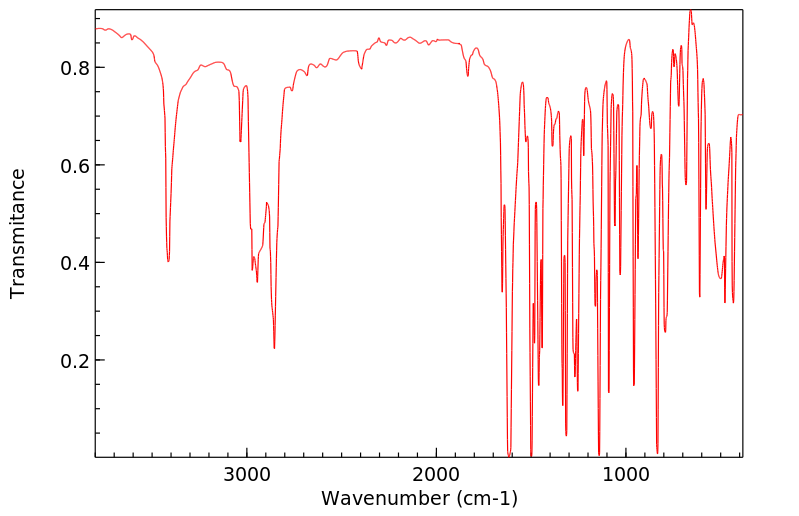6-氟吲哚啉 | 2343-23-9
中文名称
6-氟吲哚啉
中文别名
6-氟-2,3-二氢-1H-吲哚;1H-吲哚,6-氟-2,3-二氢;6-氟-吲哚啉
英文名称
6-fluoroindoline
英文别名
6-Fluoro-2,3-dihydro-1H-indole
CAS
2343-23-9
化学式
C8H8FN
mdl
MFCD00022791
分子量
137.157
InChiKey
PBLNKUULIMDAIC-UHFFFAOYSA-N
BEILSTEIN
——
EINECS
——
-
物化性质
-
计算性质
-
ADMET
-
安全信息
-
SDS
-
制备方法与用途
-
上下游信息
-
文献信息
-
表征谱图
-
同类化合物
-
相关功能分类
-
相关结构分类
物化性质
-
沸点:70-72 °C(Press: 0.3 Torr)
-
密度:1.154±0.06 g/cm3(Predicted)
计算性质
-
辛醇/水分配系数(LogP):2.2
-
重原子数:10
-
可旋转键数:0
-
环数:2.0
-
sp3杂化的碳原子比例:0.25
-
拓扑面积:12
-
氢给体数:1
-
氢受体数:2
安全信息
-
海关编码:2933990090
-
WGK Germany:3
-
危险性防范说明:P261,P280,P301+P312,P302+P352,P305+P351+P338
-
危险性描述:H302,H315,H319,H335
-
储存条件:室温且干燥环境下使用。
SDS
上下游信息
反应信息
-
作为反应物:描述:参考文献:名称:4-Bicyclic heteroaryl-piperidine derivatives as potent, orally bioavailable Stearoyl-CoA desaturase-1 (SCD1) inhibitors. Part 1: Urea-based analogs摘要:A new series of urea-based, 4-bicyclic heteroaryl-piperidine derivatives as potent SCD1 inhibitors is described. The structure-activity relationships focused on bicyclic heteroarenes and aminothiazole-urea portions are discussed. A trend of dose-dependent decrease in body weight gain in diet-induced obese (DIO) mice is also demonstrated. (C) 2013 Elsevier Ltd. All rights reserved.DOI:10.1016/j.bmcl.2013.09.096
-
作为产物:参考文献:名称:WO2008/118724摘要:公开号:
文献信息
-
Sustainable Radical Cascades to Synthesize Difluoroalkylated Pyrrolo[1,2-<i>a</i>]indoles作者:Honggui Huang、Menglin Yu、Xiaolong Su、Peng Guo、Jia Zhao、Jiabing Zhou、Yi LiDOI:10.1021/acs.joc.7b03017日期:2018.2.16We disclose herein a photocatalytic difluoroalkylation and cyclization cascade reaction of N-(but-2-enoyl)indoles with broad substrate scopes in up to 90% isolated yield. This method provides sustainable and efficient access to synthesize difluoroalkylated pyrrolo[1,2-a]indoles with a quaternary carbon center under mild conditions.
-
New Generation of Selective Androgen Receptor Degraders: Our Initial Design, Synthesis, and Biological Evaluation of New Compounds with Enzalutamide-Resistant Prostate Cancer Activity作者:Dong-Jin Hwang、Yali He、Suriyan Ponnusamy、Michael L. Mohler、Thirumagal Thiyagarajan、Iain J. McEwan、Ramesh Narayanan、Duane D. MillerDOI:10.1021/acs.jmedchem.8b00973日期:2019.1.24propanamides (series II and III) were discovered as selective androgen receptor degraders (SARDs). Initial studies of androgen receptor (AR) antagonist (1) and agonist (2) propanamides yielded a tertiary aniline (3) with novel SARD activity but poor metabolic stability. Cyclization to II and III produced submicromolar AR antagonism and protein degradation selective to AR and AR splice variant (AR SV). II and在寻找晚期前列腺癌(PCs)的小分子治疗方法的过程中,发现了一系列新颖的吲哚基和吲哚基丙酰胺(II和III系列)作为选择性雄激素受体降解剂(SARDs)。对雄激素受体(AR)拮抗剂(1)和激动剂(2)丙酰胺的初步研究产生了具有新型SARD活性但代谢稳定性较差的叔苯胺(3)。环化至II和III产生亚微摩尔的AR拮抗作用,并对AR和AR剪接变体(AR SV)产生选择性的蛋白质降解。二和三维持对enzalutamide耐药(Enz-R)突变的ARs和PC细胞的效力,并且对Enz-R异种移植物有效,表明它们具有治疗晚期PCs的潜力。新型SARD的设计,合成和生物学活性,可潜在地用于治疗各种PC,包括去势抵抗性,Enz-R和/或AR SV依赖性的晚期PC,这些已知PC通常无法用已知的激素疗法治疗讨论。
-
[EN] PURINE DERIVATIVES AS KINASE INHIBITORS<br/>[FR] DERIVES DE LA PURINE EN TANT QU'INHIBITEURS DE LA KINASE申请人:LILLY CO ELI公开号:WO2003076442A1公开(公告)日:2003-09-18The present invention provides kinase inhibitors of Formula I.本发明提供了化合物I的激酶抑制剂。
-
Hydrogenation or Dehydrogenation of N-Containing Heterocycles Catalyzed by a Single Manganese Complex作者:Viktoriia Zubar、Jannik C. Borghs、Magnus RuepingDOI:10.1021/acs.orglett.0c01273日期:2020.5.15A highly chemoselective base-metal catalyzed hydrogenation and acceptorless dehydrogenation of N-heterocycles is presented. A well-defined Mn complex operates at low catalyst loading (as low as 2 mol %) and under mild reaction conditions. The described catalytic system tolerates various functional groups, and the corresponding reduced heterocycles can be obtained in high yields. Experimental studies
-
Manganese-Catalyzed Regioselective Dehydrogenative C- versus N-Alkylation Enabled by a Solvent Switch: Experiment and Computation作者:Jannik C. Borghs、Viktoriia Zubar、Luis Miguel Azofra、Jan Sklyaruk、Magnus RuepingDOI:10.1021/acs.orglett.0c01270日期:2020.6.5base metal-catalyzed regioselective dehydrogenative alkylation of indolines using readily available alcohols as the alkylating reagent is reported. A single air- and moisture-stable manganese catalyst provides access to either C3- or N-alkylated indoles depending on the solvent used. Mechanistic studies indicate that the reaction takes place through a combined acceptorless dehydrogenation and hydrogen
表征谱图
-
氢谱1HNMR
-
质谱MS
-
碳谱13CNMR
-
红外IR
-
拉曼Raman
-
峰位数据
-
峰位匹配
-
表征信息
同类化合物
(Z)-3-[[[2,4-二甲基-3-(乙氧羰基)吡咯-5-基]亚甲基]吲哚-2--2-
(S)-(-)-5'-苄氧基苯基卡维地洛
(R)-(+)-5'-苄氧基卡维地洛
(R)-卡洛芬
(N-(Boc)-2-吲哚基)二甲基硅烷醇钠
(E)-2-氰基-3-(5-(2-辛基-7-(4-(对甲苯基)-1,2,3,3a,4,8b-六氢环戊[b]吲哚-7-基)-2H-苯并[d][1,2,3]三唑-4-基)噻吩-2-基)丙烯酸
(4aS,9bR)-6-溴-2,3,4,4a,5,9b-六氢-1H-吡啶并[4,3-B]吲哚
(3Z)-3-(1H-咪唑-5-基亚甲基)-5-甲氧基-1H-吲哚-2-酮
(3Z)-3-[[[4-(二甲基氨基)苯基]亚甲基]-1H-吲哚-2-酮
(3R)-(-)-3-(1-甲基吲哚-3-基)丁酸甲酯
(3-氯-4,5-二氢-1,2-恶唑-5-基)(1,3-二氧代-1,3-二氢-2H-异吲哚-2-基)乙酸
齐多美辛
鸭脚树叶碱
鸭脚木碱,鸡骨常山碱
鲜麦得新糖
高氯酸1,1’-二(十六烷基)-3,3,3’,3’-四甲基吲哚碳菁
马鲁司特
马鞭草(VERBENAOFFICINALIS)提取物
马来酸阿洛司琼
马来酸替加色罗
顺式-ent-他达拉非
顺式-1,3,4,4a,5,9b-六氢-2H-吡啶并[4,3-b]吲哚-2-甲酸乙酯
顺式-(+-)-3,4-二氢-8-氯-4'-甲基-4-(甲基氨基)-螺(苯并(cd)吲哚-5(1H),2'(5'H)-呋喃)-5'-酮
靛青二磺酸二钾盐
靛藍四磺酸
靛红联二甲酚
靛红磺酸钠
靛红磺酸
靛红乙烯硫代缩酮
靛红-7-甲酸甲酯
靛红-5-磺酸钠
靛红-5-磺酸
靛红-5-硫酸钠盐二水
靛红-5-甲酸甲酯
靛红
靛玉红衍生物E804
靛玉红3'-单肟5-磺酸
靛玉红-3'-单肟
靛玉红
靛噻
青色素3联己酸染料,钾盐
雷马曲班
雷莫司琼杂质13
雷莫司琼杂质12
雷莫司琼杂质
雷替尼卜定
雄甾-1,4-二烯-3,17-二酮
阿霉素的代谢产物盐酸盐
阿贝卡尔
阿西美辛杂质3







